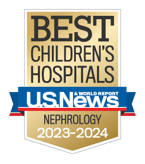Dialysis Program
Nationally ranked by U.S. News & World Report

Dialysis
The Dialysis Program at Children's Mercy cares for children with all types of kidney disorders who need renal replacement therapy with dialysis. Our program is nationally and internationally recognized as a leader in pediatric dialysis care and research.
Dr. Bradley Warady, Director of the Division of Nephrology at Children’s Mercy, helped create international guidelines for pediatric dialysis treatment and has co-authored two prominent textbooks on the subject.
Our program combines medical expertise with a personalized approach for each child, so that you know your child is receiving the best possible care.
What is dialysis?
Dialysis is a type of medical treatment that replaces some of the functions of the kidneys using an artificial kidney machine (hemodialysis) or the lining of your child’s belly (peritoneal dialysis).
Healthy kidneys act as a filter for the body, removing waste products, salt and extra water from the blood and keeping appropriate levels of certain chemicals the body needs, like potassium, sodium and bicarbonate.
Doctors track kidney function using percentages to show how effectively the kidneys are working. If your child has lost about 85-90 percent of their kidney function, this is called end-stage kidney failure. At this point, dialysis helps keep their body in balance until they can receive a kidney transplant.
Dialysis treatment
Children’s Mercy has built a dialysis program that centers around what children and families need. First and foremost, we strive to offer effective treatment that is as comfortable and suited to your family’s lifestyle as possible.
At home
Our home hemodialysis program is one of the few programs in the nation designed specifically for pediatric needs. We are able to offer this option to our patients because of the strong partnerships and extensive training we provide to parents and caregivers so that families feel confident in caring for their child at home.
In the hospital
Our dialysis unit at the hospital has 10 treatment stations and is one of the largest pediatric-specific dialysis units in the nation. Our dedicated team will build a relationship with your child so that each time you come, you feel welcome. We view the families as partners and are always incorporating their ideas and suggestions to help us make our program better.
Nationally ranked by U.S. News & World Report
Nationally ranked by U.S. News & World Report
We offer a full range of treatments for children birth through 21 years old that include:
-
Peritoneal Dialysis (PD) (in-center and home) - Peritoneal dialysis is a treatment for kidney failure that cleans your blood inside your body. It uses the lining in your peritoneal cavity (your belly) to filter your blood.
-
Hemodialysis (HD) (in-center and home) - Hemodialysis is a treatment for kidney failure that cleans your blood outside of your body. We use a hemodialysis access to get blood from your body to the dialysis machine and back to you. Your care team will teach you how to care for your access.
-
Continuous Renal Replacement Therapy (CRRT) - Continuous Renal Replacement Therapy is performed in the Intensive Care Unit by specially trained nurses for people with acute kidney injuries.
Advancing kidney care for the best outcomes
The dialysis program at Children’s Mercy has significantly lower infection and complication rates compared to the national average. Families go through up to 10 days of training on home peritoneal dialysis before they begin, which helps reduce catheter-related and peritonitis infection rates in their children. Families on home hemodialysis receive training over a six-week period.
Children’s Mercy is a leader in the Standardizing Care to Improve Outcomes in Pediatric End-Stage Renal Disease quality collaborative (also known as SCOPE). With 47 centers participating in the collaborative, SCOPE has successfully decreased the peritonitis rate in their peritoneal dialysis population by 39 percent.
Our researchers are also investigating the use of medications designed to prevent/control bone disease, manage anemia and enhance growth in children receiving dialysis.
We coordinate the International Pediatric Peritoneal Dialysis Network (IPPN), an initiative that has resulted in publications and treatment recommendations pertaining to the management of bone disease, heart disease and nutrition in children receiving peritoneal dialysis.
We coordinate and actively participate in prospective dialysis related studies and the collection of registry data by the North American Pediatric Renal Trials and Collaborative Studies (NAPRTCS).
